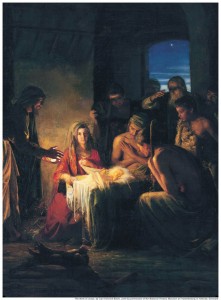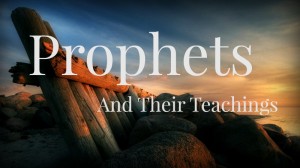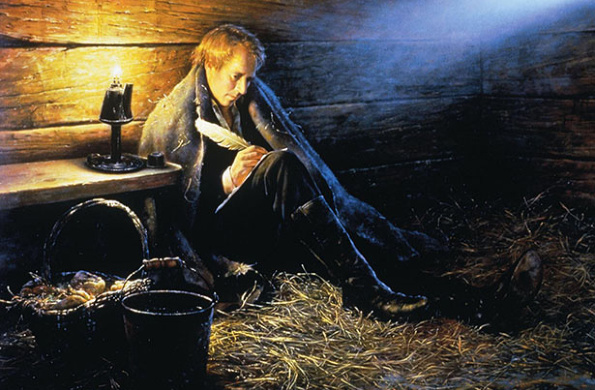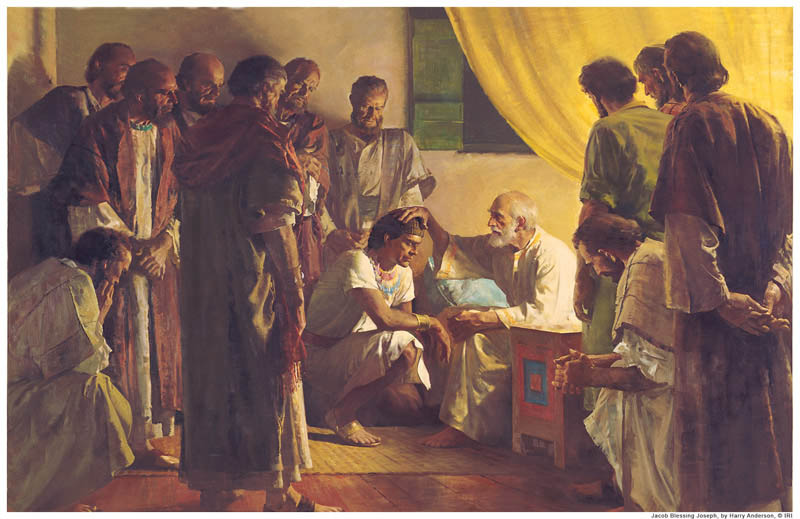Read part one of this four-part series in which we look at how the Lord hopes we will learn to look at suffering in this life.
You might recall that Alma was originally one of the wicked priests of King Noah. The teachings of the prophet Abinadi converted Alma, who then became the leader of a whole converted segment of the population. When the king came looking to kill Alma and his people, Alma led them into the wilderness. They arrived in a place called Helam, and began to prosper in that place, being obedient to all the commandments of God. Spoiler alert: these verses (Mosiah 23:21-24) tell the ending of their story.
Nevertheless the Lord seeth fit to chasten his people; yea, he trieth their patience and their faith. Nevertheless—whosoever putteth his trust in him the same shall be lifted up at the last day. Yea, and thus it was with this people.
For behold, I will show unto you that they were brought into bondage, and none could deliver them but the Lord their God, yea, even the God of Abraham and Isaac and of Jacob. And it came to pass that he did deliver them, and he did show forth his mighty power unto them, and great were their rejoicings.
As the Lamanite army was chasing King Limhi and his people back to Zarahemla (this comes from an earlier story in the Book of Mormon), they happened to find Alma and his people… And it just so happened that their leader was one of the most wicked of the wicked priests of King Noah, named Amulon. Amulon won the favor of the king of the Lamanites and was made a sub-king over a number of lands, one of which included the people of Alma. Amulon and some of the other wicked priests blamed much of their sufferings on Alma and relished the idea of making him suffer as much as possible.
Amulon began to persecute Alma and he caused “that his children should persecute their children.” He placed taskmasters over Alma’s people and “so great were their afflictions that they began to cry mightily to God.” Amulon “fixed” this by declaring that if the people were caught praying, they would be put to death. That did not stop the prayers of these righteous souls. They poured out their hearts in silent prayer to God, and He knew the “thoughts of their hearts.”
This next part is very important, so I will quote it directly from the scriptures. It is in these verses from Mosiah 24:13-16 that the lessons are to be learned.
And it came to pass that the voice of the Lord came to them in their afflictions, saying: Lift up your heads and be of good comfort, for I know of the covenant which ye have made unto me; and I will covenant with my people and deliver them out of bondage.
And I will also ease the burdens which are put upon your shoulders, that even you cannot feel them upon your backs, even while you are in bondage; and this will I do that ye may stand as witnesses for me hereafter, and that ye may know of a surety that I, the Lord God, do visit my people in their afflictions.
And now it came to pass that the burdens which were laid upon Alma and his brethren were made light; yea, the Lord did strengthen them that they could bear up their burdens with ease, and they did submit cheerfully and with patience to all the will of the Lord.
And it came to pass that so great was their faith and their patience that the voice of the Lord came unto them again, saying: Be of good comfort, for on the morrow I will deliver you out of bondage.
These were righteous people who obeyed the commandments. The Lord allowed them to fall into bondage for very specific reasons. One reason is for the purification of this group of people. This experience helped them develop greater faith in the Lord, patience in suffering, and a closeness as a people (think Zion society—of one heart and one mind). The Lord said He needed them to be witnesses to others that He really does visit His faithful saints in times of affliction.
The Lord did not just remove their suffering, but he strengthened them. In this case, He strengthened them physically so they were able to carry their physical burdens and not feel the adverse physical effects of their bondage. So great was their patience in their suffering, and so great was their cheerfulness in their time of bondage, that the Lord told the prophet Alma that on the morrow He would miraculously deliver the people from their bondage.
The fact that they suffered in patience, and did so cheerfully, seems to be an important aspect of what the Lord is looking for in these instances. We’ll see more of that requirement as we go along. Oh, and to finish the story, they spent all night gathering their possessions and flocks, and in the morning the Lord caused all the Lamanites to fall into a deep sleep so the people of Alma were able to just walk out of town. They all arrived safely in Zarahemla.
Nephi, Grandson of Helaman
 Back story: The Lamanite prophet, Samuel, made a big fuss on the city walls of Zarahemla about the signs that would precede the Savior’s birth. This was thrilling to the members of the Church, but was a sore point for those who hated the Church. When the signs of the Savior’s coming began to be fulfilled, the people who did not like the Church began to get very vocal about the “failed” prophecy. This may happen to us over something or other someday, so pay attention. Their voices of protest got louder and louder until they finally proclaimed that if the sign of the Savior’s birth was not fulfilled by a certain date, all the people who believed in the teachings of the prophets would be killed.
Back story: The Lamanite prophet, Samuel, made a big fuss on the city walls of Zarahemla about the signs that would precede the Savior’s birth. This was thrilling to the members of the Church, but was a sore point for those who hated the Church. When the signs of the Savior’s coming began to be fulfilled, the people who did not like the Church began to get very vocal about the “failed” prophecy. This may happen to us over something or other someday, so pay attention. Their voices of protest got louder and louder until they finally proclaimed that if the sign of the Savior’s birth was not fulfilled by a certain date, all the people who believed in the teachings of the prophets would be killed.
Nephi, who was the prophet was very grieved at this. He had no more knowledge of when the sign was to be given than any of the people. They were his responsibility, and he had to answer for their welfare to the Lord. On the day before the murders were to take place he spent all day long praying to the Lord. This was the Lord’s response in 3 Nephi 1:13:
Lift up your head and be of good cheer; for behold, the time is at hand, and on this night shall the sign be given, and on the morrow come I into the world, to show unto the world that I will fulfill all that which I have caused to be spoken by the mouth of my holy prophets.
Happy endings—I like those. When the Lord makes a promise but the time for fulfillment seems to have passed us by, are we willing to stay faithful to the promise until further knowledge is revealed? When we are at the end of our rope, so to speak, how long are we willing to spend on our knees until we receive direction and guidance?
There seems to be a strong connection to faith and cheerfulness. Cheerfulness supports faith, whereas gloom and doom defeats our faith. Even when things look dark for us, are we willing to lift up our heads and be of good cheer because in our hearts we fully believe that the Lord has already come off the victor, and that no mortal situation can put a dent in that eternal victory? The cheerfulness seems to be an indicator as to how strong our faith is.
Joseph Smith in Liberty Jail
 In all the preceding examples, we have very little text, because we are relying on what was recorded by the prophets in scripture. Let’s face it—scripture is not exactly known for being full of juicy details. But in the case of Joseph Smith, we have lots of details. We have so many details about his incarceration in Liberty Jail that I will have to leave most of them out due to space considerations.
In all the preceding examples, we have very little text, because we are relying on what was recorded by the prophets in scripture. Let’s face it—scripture is not exactly known for being full of juicy details. But in the case of Joseph Smith, we have lots of details. We have so many details about his incarceration in Liberty Jail that I will have to leave most of them out due to space considerations.
The contents of this part come from the talk given by Elder Holland called “Lessons From Liberty Jail.” It is an amazing article and one I strongly encourage you to read. Let’s paint the backdrop of this scene so you get an idea as to why the prophet was so distressed.
Liberty Jail was essentially escape-proof, with walls four feet thick, a holding cell that was below the floor, with a ceiling that was low enough that anyone close to six feet in height would have to stoop to walk around. The floors were rough-hewn slabs of bare stone with dirty straw here and there, but not enough of it to protect them from the cold of the rock they were forced to sleep on during one of the coldest winters ever recorded in Missouri, USA.
Their food was sometimes contaminated and old. One of them in the jail said the food was so filthy they could only eat it when “driven to it by hunger.” On at least four occasions they were deliberately poisoned so they either spent days vomiting or in a state of delirium, not caring whether they lived or died. The wicked speech and behavior of the guards was so bad that Joseph said that even angels could not adequately describe the “malice of hell” that he suffered there.
These are just some of the things that caused those in the jail to suffer. After months of this treatment, which probably seemed like a lifetime to them, Joseph finally broke down and plead with the Lord. He wanted to know why he and his friends who suffered with him had been abandoned by God to suffer like this? How long was the Lord going to let it continue? Basically, he was saying to the Lord, “Where are you? Why are you hiding from us? How long will you continue to let this go on?” This conversation makes up three sections of the Doctrine and Covenants: Sections 121, 122, and 123.

To read more of Kelly’s articles, click here.
In response to his accusations of abandonment, though admittedly, very respectfully worded, the Lord sets the record straight with the prophet. He challenges the prophet’s thinking about just how much he has suffered by asking Joseph if he thinks he is greater than God? He reminds Joseph that he has not yet suffered as much as Job. The conversation continues and the Lord teaches the prophet about His plans for the righteous and for the wicked that persecute the saints. His opening words are found in D&C 121:7-8.
My son, peace be unto thy soul; thine adversity and thine afflictions shall be but a small moment;
And then, if thou endure it well, God shall exalt thee on high; thou shalt triumph over all thy foes.
Joseph was strong. He lasted months before he broke down and complained to the Lord about his condition. The Lord was patient with him, and let him get to the end of his rope then watched to see how he would react. As you read the first six verses of Section 121, pay careful attention to how respectfully Joseph addresses the Lord, even under these dire circumstances. In the next section we will look at some of the principles we can all learn from our personal times when we feel like we have been put into Liberty Jail.
Kelly Merrill is semi retired and writes for https://gospelstudy.us. He lives with his wife in Idaho. His strength is being able to take difficult to understand subjects and break them down into understandable parts. He delights in writing about the gospel of Christ. Writing about the gospel is his personal missionary work to the members of the Church and to those of other faiths who are wanting to know more about Christ’s gospel and His Church.







This is so insightful! I had to share it. Thank you!